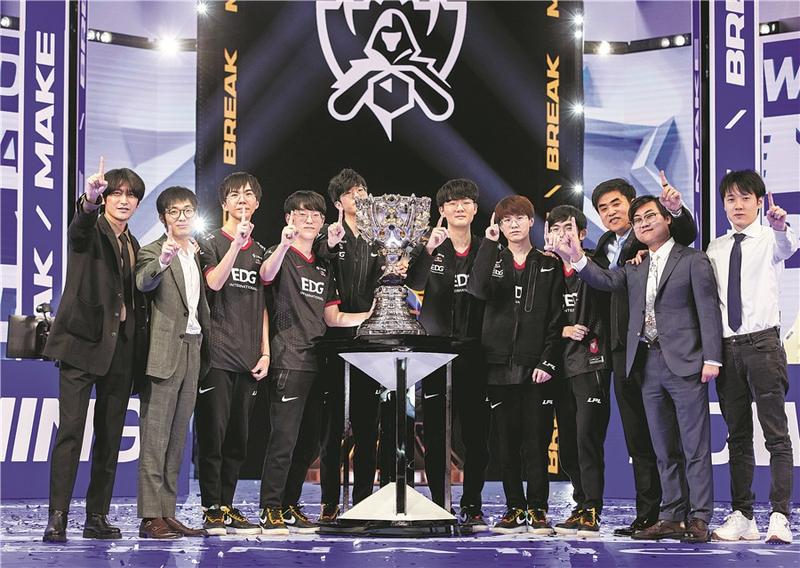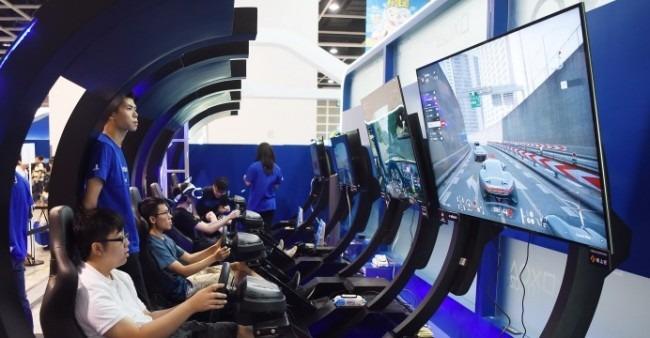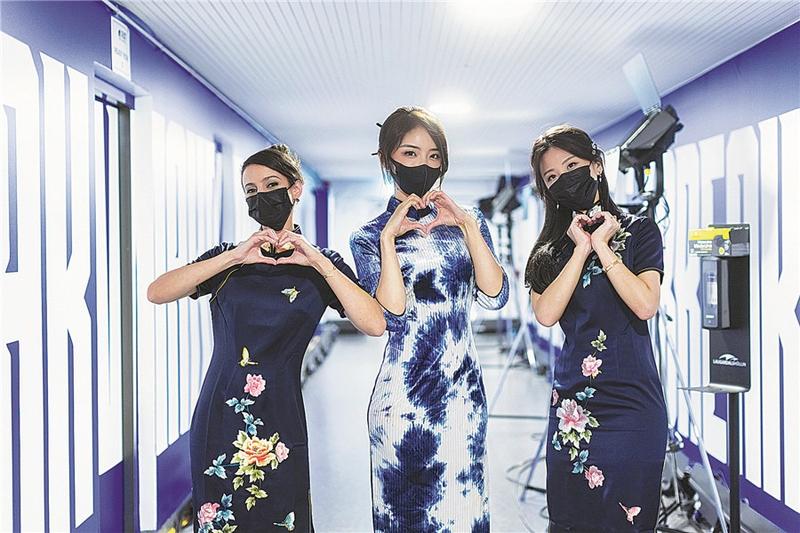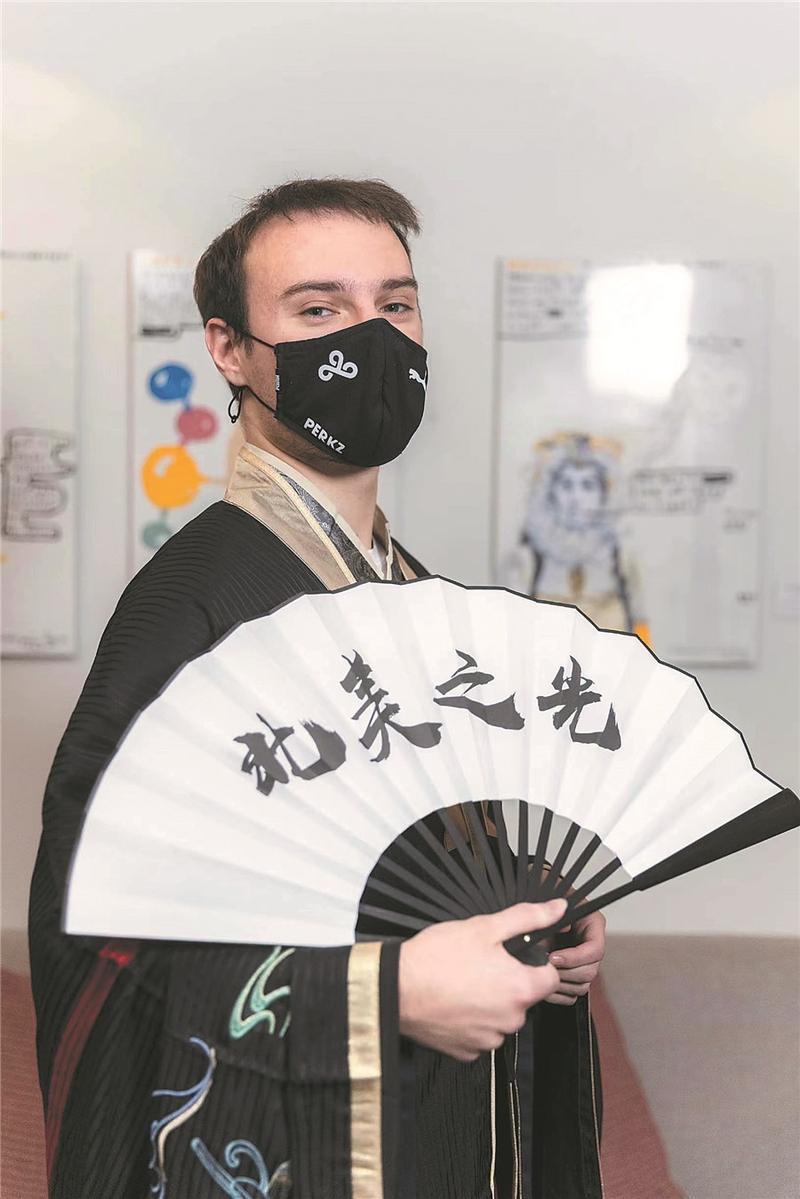 EDward Gaming team members celebrate winning the League of Legends 2021 World Championship final in Reykjavik, Iceland, on Nov 7. (PHOTO PROVIDED TO CHINA DAILY)
EDward Gaming team members celebrate winning the League of Legends 2021 World Championship final in Reykjavik, Iceland, on Nov 7. (PHOTO PROVIDED TO CHINA DAILY)
Fans celebrated in style this month after a Chinese club won the world esports title, the latest milestone in an activity that is experiencing rapid growth in China.
Supporters cheered the victory by EDward Gaming, or EDG, in pubs with friends, celebrated with roommates at university campuses and sent countless messages of congratulations on social media.
EDG beat defending champion Damwon KIA, or DK, from South Korea 3-2 in the League of Legends 2021 World Championship in Reykjavik, Iceland, on Nov 7.
It was the third world title won by a team from China's League of Legends Pro Leaguethe LPL-the nation's leading professional division in the sport. Invictus Gaming won the championship for LPL in 2018 and FunPlus Phoenix in 2019.
We never expected such huge support from the fans. Many people know about esports and support us, which is really surprising ... I think we had so much support because DK was the defending champion and appeared to be stronger than us.
Tian Ye, also known as Meiko, EDward Gaming (EDG) player
EDG's victory quickly went viral on Chinese social media. Of the top 10 topics trending on Sina Weibo on the night the club won the title, five were related to the final.
On Friday, EDG player Tian Ye, 23, also known as Meiko, said during an interview with China Daily on Sina Weibo, which attracted 3 million viewers: "We never expected such huge support from the fans. Many people know about esports and support us, which is really surprising."
"I think we had so much support because DK was the defending champion and appeared to be stronger than us."
As it was the first time EDG had reached the League of Legends World Championship final, the players were understandably nervous.
ALSO READ: Formula One series extends successful Shanghai stay
Tian added: "Our coach had faith in us. We believed in ourselves after our performances in previous matches and training sessions. Instead of putting too much pressure on ourselves, we remained positive.
"We've had many hard matches this season, so we've become experienced in dealing with tough situations. As long as there's still a chance in a match, we remain very calm. Our coach also helps us to quickly adjust our mindset and tactics.
"Many fans and our families made videos to support us before the final, which helped boost our confidence. We were both excited and nervous ... Our mentality was extremely good during matches, especially when we faced tough situations. It felt unbelievable to be in the final-something I never expected."
 This undated file photo shows young people playing esports games. (PHOTO / XINHUA)
This undated file photo shows young people playing esports games. (PHOTO / XINHUA)
Being a professional gamer is tough, and it requires a lot of hard work to appear in international matches.
Tian said EDG's training usually starts in the afternoon, with the first session lasting about five hours. After dinner, the squad has about two hours of physical training, during which fitness coaches and the club's medical support team help players exercise and relax.
ALSO READ: Esports take step closer to becoming an Olympic sport
Esports players also need good physical strength and stamina to maintain 100 percent focus during matches, which can last four to five hours. After physical training, the players still practice for several hours each night.
Tian said: "Professional players and regular gamers are very different. I think a high degree of talent is needed to become a professional.
"Regular gamers play for fun and relaxation, but we need to focus on every detail of the sport. The players and coaches also need to cooperate and we must have good tactics."
Pan Yibin, EDG's general manager, said being a professional gamer is not a profession for everyone, and neither should esports be an excuse for young people to abandon their education and escape from reality.
Many parents send their children to our club for trials, but 99 percent of the kids don't stay with us for more than a week. They cannot accept the hardship of being a professional gamer ... Esports players are just like traditional athletes who need to accept hard training and strict management. We have a massive amount of data to help us analyze if a person can become a professional gamer.
Pan Yibin, EDG's general manager
"Many parents send their children to our club for trials, but 99 percent of the kids don't stay with us for more than a week. They cannot accept the hardship of being a professional gamer," Pan told Beijing News.
"Esports players are just like traditional athletes who need to accept hard training and strict management. We have a massive amount of data to help us analyze if a person can become a professional gamer."
One of the main reasons for the surprising results achieved by Chinese esports teams in international tournaments is the dramatic development of the industry at home.
According to LPL, its live matches last year were viewed 21.8 billion times, while the number of views for all its content, including related shows and interviews, reached more than 100 billion.
Moreover, according to the 2020 Global Esports Development Report published by Tencent Esports and Penguin Intelligence, the total number of Chinese gamers and fans reached 400 million at the end of last year, a 14.3 percent annual growth rate. In 2019, the Chinese esports market was valued at 13.8 billion yuan ($2 billion).
ALSO READ: E-sports in full swing in NW China
Tian said he has witnessed the industry's growth over the years.
"Our tournaments are becoming increasingly professional, with more fans and spectators. The venues are also becoming better and better."
Skills in demand
However, the majority of those in the industry are not elite gamers, as there is demand for a wide range of other skills, including club management, game design, publicity and business cooperation.
 Yu Shuang (right), LPL host, wears a qipao during the final. (PHOTO PROVIDED TO CHINA DAILY)
Yu Shuang (right), LPL host, wears a qipao during the final. (PHOTO PROVIDED TO CHINA DAILY)
If someone really wants to know this industry, they should be aware that there are many outstanding players. The top players train very hard each day, but repetitive training can be very boring. As it's extremely competitive, we consider it a sport.
Xia An, also known as Wendy, host and interpreter for China's League of Legends Pro Leaguethe (LPL)
Xia An, also known as Wendy, who works as a host and interpreter for the LPL is just one example of such talent.
She went viral on Chinese social media after a post-match interview at the World Championship this month, when she fluently switched between three languages-Chinese, English and Korean-to help interview players from different countries.
Xia said, "Apart from the top gamers, many other people work in the sector. We also need different types of talent to work for esports, which is growing quickly.
"I chose to work in this field because I was deeply impressed by the atmosphere at major esports tournaments at big venues. I was just a spectator, but I was touched by the passion of the fans and players.
"If someone really wants to know this industry, they should be aware that there are many outstanding players. The top players train very hard each day, but repetitive training can be very boring. As it's extremely competitive, we consider it a sport.
"However, with such dramatic and rapid development, there are downsides. Some low quality live broadcasts could have a negative influence on teenagers. This calls for stricter supervision, and we want to set examples and promote the positive spirit of esports to more people."
Esports has also become a platform for promoting Chinese culture on the international stage.
Tian said that during this year's World Championship, the LPL sent numerous gifts featuring elements of traditional Chinese culture to foreign rivals. The gifts included folding paper fans, Chinese knots and a copy of The Art of War, an ancient Chinese military treatise.
Jin Yibo, CEO of TJ Sports, which operates the LPL, said: "As a competitive sport, results at major tournaments are important. Apart from that, we should also be proactive in promoting our culture.
 Croatian player Luka Perkovic wears hanfu and holds a paper fan given by China's League of Legends Pro League. (PHOTO PROVIDED TO CHINA DAILY)
Croatian player Luka Perkovic wears hanfu and holds a paper fan given by China's League of Legends Pro League. (PHOTO PROVIDED TO CHINA DAILY)
"The LPL has been trying to help China show its soft power on the international stage. We have added numerous outstanding Chinese cultural elements to the LPL, and have invested many resources and put in a great deal of effort to create quality content that attracts foreign fans."
Xia, who is also an avid promoter of Chinese culture, said this is why she likes to wear different styles of the traditional qipao, or women's dress, during interviews.
READ MORE: China plays leading role in eSports boost amid pandemic
"For many foreign audiences, it's a new experience to see traditional Chinese culture featuring in esports. We also sent hanfu (traditional Chinese apparel) as gifts to foreign players, hosts and commentators at the final," Xia said.
"Many of them asked us about the meaning of the graphics on the clothing. Some foreign makeup artists also asked us how to apply makeup with a more traditional Chinese style, and I even taught them how to use a traditional Chinese hairpin."
Contact the writers at shifutian@chinadaily.com.cn


